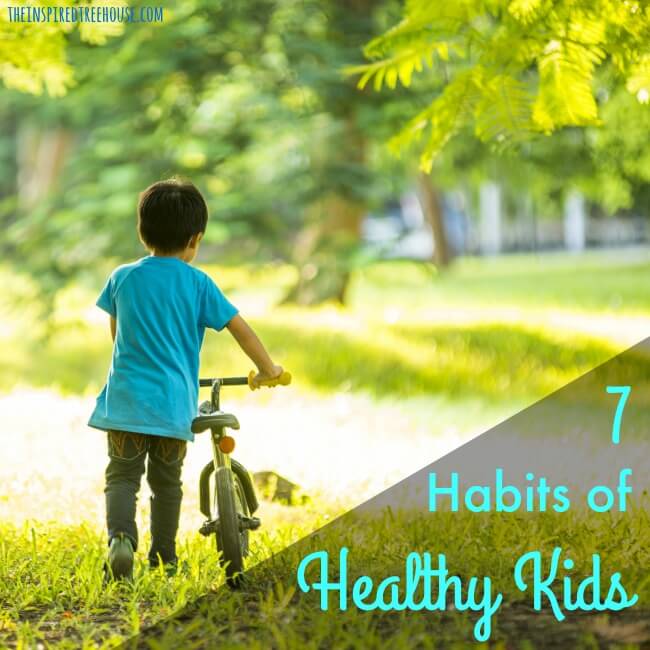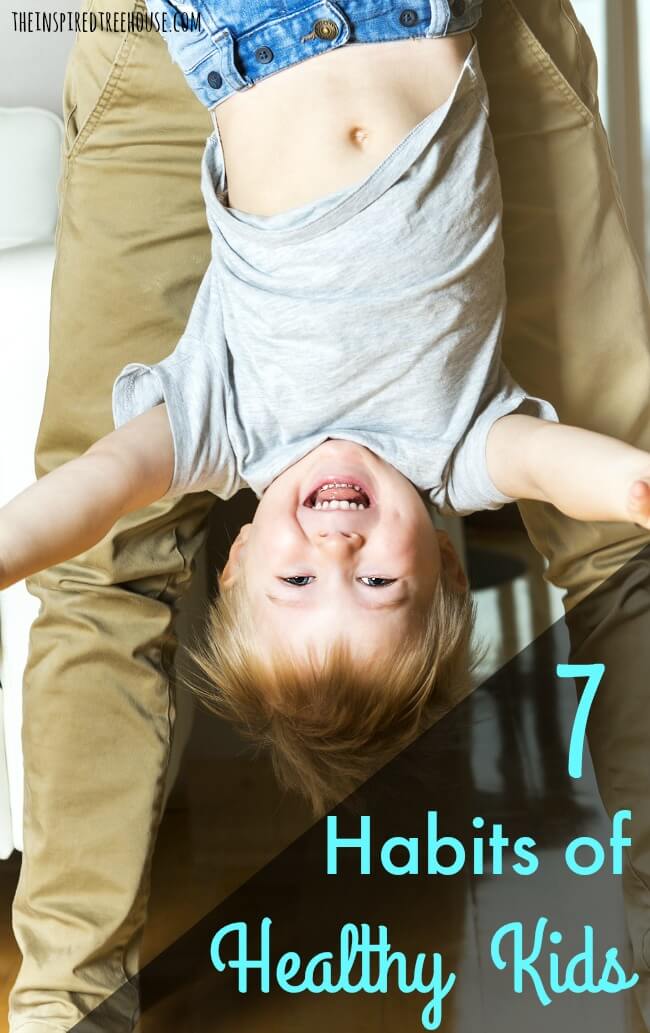Parents are constantly inundated with information on how to raise happy, healthy kids and sometimes it can seem like a complicated formula. Look around online and you’ll find millions of articles, books, and blog posts tackling every parenting issue from sleep to potty training to nutrition and more.
Today, we wanted to take a closer look at some simple things healthy kids and families have in common. These 7 habits are some of the most important when it comes to supporting healthy development.
1 || Healthy kids have parents who are healthy eaters.
One of the strongest predictors of the quality of a child’s diet is his or her parents’ diet. Studies show that when mom and dad are eating lots of fruits and veggies, kids end up eating more of them them too. Making sure that healthy foods are part of our diet not only helps ensure that these foods are readily available to our kids, but also provides them with a model of how to eat a healthy, balance diet. Studies also show that this type of passive modelling is more effective than strictly controlling or restricting children’s diets.
For children who exhibit extreme picky eating behaviors, however, this modelling approach may not be enough. Here are our best tips for addressing picky eating in kids.
2 || Healthy kids take risks.
As parents, we worry about our kids. It’s our job. But even though our instincts tell us to swoop in and save the day, studies show that risk-taking can be extremely beneficial to our kids’ health. Allowing our kids to engage in risky play can lead to increased physical activity, increased social competence and well-being, and enhanced creativity and resilience.
Here are some great tips for letting go a little and allowing kids to get out there, explore, and take risks on their own!
3 || Healthy kids engage in unsupervised, unstructured play.
Not only is it great for our kids when we back off a little and let them take risks, it’s also really important to allow kids to engage in lots of free, unstructured play. This means ensuring that their days aren’t so full of scheduled lessons, classes, and practices that there’s no time for good old-fashioned play!
Research has found that the more time children spend in unsupervised, unstructured activities, the better they score on executive functioning measures. Many other health benefits are derived from free, unstructured play, including brain development, social skill development, creativity, leadership skills, stress reduction, and more.
We’ve got lots of great tips for parents and caregivers who know the value of free play!

4 || Healthy kids move their bodies…a lot.
In fact, studies find that the more they move, the more health benefits kids get and more vigorous and active play seems to provide the greatest benefits. It’s hard to sum up all of the amazing health benefits kids get from active play, but just to name a few…physical activity is correlated with musculoskeletal health, cardiovascular health, healthy blood pressure and body fat, decreased anxiety and depression, and increased self-concept and academic performance. Not to mention the amazing sensory benefits of movement!
Just how much physical activity do they need? The experts say at least 60 minutes of moderate to vigorous activity should do the trick for most kids…but remember this is a minimum! Adding more than 60 minutes of active play to your daily routine is an added bonus!
Need ideas for active play? Look no further! We feature tons of great movement activities here at The Inspired Treehouse! Here are a few of our favorites:
–Teaching Your Child How to Jump Rope
5 || Healthy kids explore using all of their senses.
In addition to movement, exploration using the other senses (hearing, vision, smell, taste, and touch) is extremely important when it comes to healthy development.
Kids learn about the world around them and assign meaning to their surroundings using their senses. Sensory processing is also closely tied to motor development, language development, cognitive development, and more.
Sensory exploration through play is so important for kids. And we’re not just talking about getting your hands messy. Kids need exposure to all kinds of movement, sounds, smells, tastes, and sights in their play for healthy development. Looking for ideas? Check out our book, Sensory Processing 101!
6|| Healthy kids get lots of sleep.
No doubt about it, sleep is one of the most important underlying factors for physical development, attention, behavior, immunity, learning, memory, and more!
Many children have difficulty falling asleep and staying asleep through the night. Studies find that the more active kids are (see number 4 above), the faster they fall asleep and the longer they sleep at night.
Research also points to the importance of establishing a regular beditme routine and, for some kids, using sensory strategies can help them calm down at bedtime.
7 || Healthy kids get lots of hugs.
It’s no secret that loving touch is one of the most important things you can give your kids from the moment they are born. Human touch, via hugs, pats on the back, playful wrestling, and loving strokes plays a large role in children’s sensory development. Research has shown the importance of touch in developing a healthy sense of proprioception and body awareness.
But beyond physical development, touch can also help calm anxiety in certain groups and is seen as an essential element of the human experience, conveying deep emotional meaning between the person doing the touching and the person who is being touched.
Most often, loving touch between parents and their children comes naturally. A fun and often-overlooked way to deliver some playful loving touch to your little ones is roughhousing or rough and tumble play. But a good old-fashioned hug works too!

Sign up to receive our newsletter, a roundup of our favorite posts and other great finds from around the web delivered right to your inbox!
Latest posts by Claire Heffron (see all)
- Cute Zipper Bags for Therapists - April 18, 2024
- Fairy Tale Games and Toys - April 12, 2024
- The Best Emotional Regulation Books for Kids - April 8, 2024

